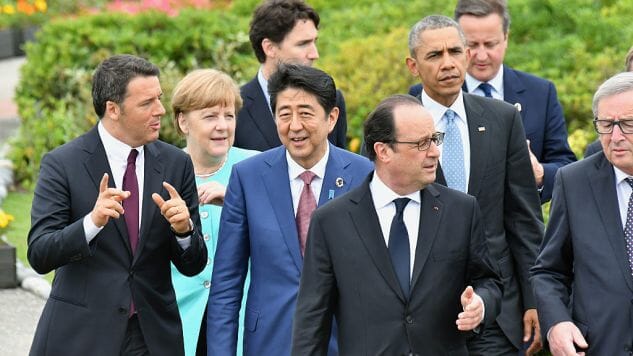Four of the G-7 Heads Are Gone: We Need Politics With A Wider Scope
The times, they are a’changin’
Foreign Ministry of Japan / Getty Images
“You hear that Mr. Anderson? That is the sound of inevitability.”
The picture above is a portrait of a vanishing world.
Four of the people in that image are no longer with us. Oh, they’re not dead—just retired or out of power, which is only slightly worse.
This photo of the G-7 leaders was taken on May 26, 2016, during a summit in Kashikojima, Japan. From left to right: Italian Prime Minister Matteo Renzi, German Chancellor Angela Merkel, Canadian Prime Minister Justin Trudeau, Japanese Prime Minister Shinzo Abe, French President Francois Hollande, Obama, British Prime Minister David Cameron, and European Commission President Jean-Claude Juncker. Back in the spring, these were the most powerful persons in the world who weren’t named Vladimir Putin or Mark Zuckerberg.
How things do change. Yesterday, Renzi announced he’d step down as the PM of the center-left Italian Democratic Party. With the fall of Renzi, Twitter and various press outlets have been sharing pictures from international summits earlier in the year, as if they were passing around old photos of Sgt. Pepper and his band. “4 down … Merkel to go,” wrote one Trump supporter.
Obama yielded to Trump. True, his term was up, but his coalition has also been turned down at the polls, which is the kiss of death for a legacy. Cameron stepped down after Brexit, leaving Theresa May in charge. Hollande has been discredited, and will be replaced by either the centrist Fillon or the far-right-wing Le Pen. Renzi is out. As for the rest, Merkel is bloodied but has survived to austere another day. Abe is still kicking, and will remain powerful. Trudeau is still there, but we all understand that Canadians are not like the rest of the world, or anyone.
But that’s unfair. In truth, none of these people were much like the citizens they were supposed to represent. Not a one of them—the inheritors of flawed meritocracies and corporate-friendly states—could reckon with the disaster capitalism of the 21st century. Obama is only the most obvious failson among them. The populist wave has come and washed much of this away. On the brighter side, this is the kind of year which gives low-rent elitist rags like The Economist heartburn: “The world is at a crossroads! Cut the estate tax! Who will think of Eton?”
Depending on your politics, you might see them as a collection of decent technocrats who were hapless before a nativist reaction. Or, if you’re like me, you see them as two-bit apologists for an unfair order who lacked the courage and political will to respond to popular outrage, and thereby allowed for a series of bizarre right-wing weirdos to come to power.
POLITICS ISN’T LOCAL
This picture makes the argument that what is happening is bigger than Trump and American culture.
We treat American politics as special, and pay a lot of attention to the particular circumstances that elevated Trump to the White House. Because Americans are, well, American, we speak of ourselves as being without parallel. We assume the mad events that happen in our country aren’t happening anywhere else. We focus on one nation.
-

-

-

-

-

-

-

-

-

-

-

-

-

-

-

-

-

-

-

-

-

-

-

-

-

-

-

-

-

-

-

-

-

-

-

-

-

-

-

-








































